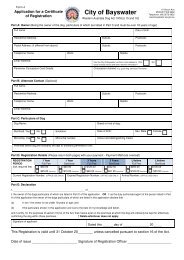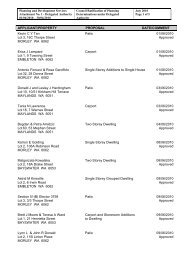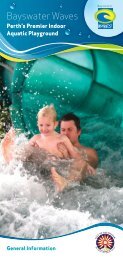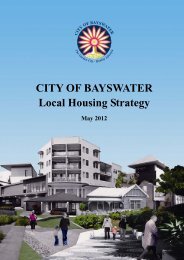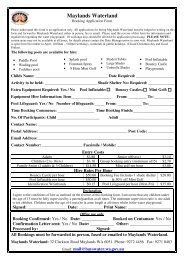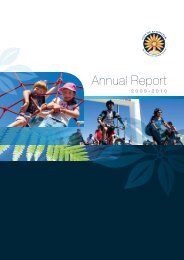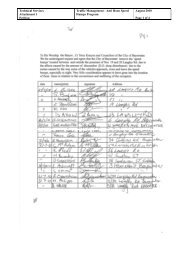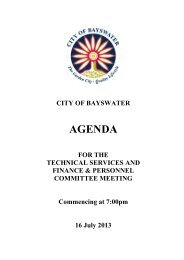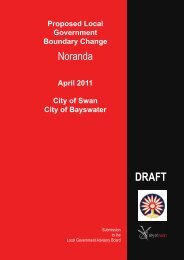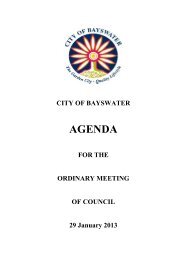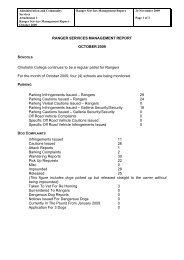annual report - City of Bayswater
annual report - City of Bayswater
annual report - City of Bayswater
Create successful ePaper yourself
Turn your PDF publications into a flip-book with our unique Google optimized e-Paper software.
Environmental health<br />
Food monitoring<br />
and inspections<br />
The <strong>City</strong>’s Environmental Health<br />
Section monitors premises that<br />
prepare food for sale, to ensure<br />
compliance with State and local<br />
laws and regulations.<br />
The <strong>City</strong>’s environmental health<br />
<strong>of</strong>ficers are responsible for<br />
implementing a food sampling<br />
program and undertaking routine<br />
food premise inspections to ensure<br />
that a high level <strong>of</strong> food hygiene<br />
is maintained.<br />
There are around 320 food<br />
premises within the <strong>City</strong> and<br />
<strong>of</strong>ficers aim to undertake up to<br />
four routine inspections <strong>of</strong> all<br />
high risk food premises within the<br />
<strong>City</strong> each year. Those premises<br />
which are found to be noncompliant<br />
with the regulations<br />
are inspected on a more frequent<br />
basis, to ensure that standards are<br />
continuously improved.<br />
The routine food sampling program<br />
aims to ensure that food sold within<br />
the <strong>City</strong> is <strong>of</strong> an acceptable standard<br />
and is safe for consumption. A total<br />
<strong>of</strong> 83 food samples were collected<br />
and submitted for bacteriological<br />
and chemical analysis and complaint<br />
investigation during 2008-09.<br />
The majority <strong>of</strong> the results were<br />
satisfactory; however 11 required<br />
follow-up action and one has been<br />
listed for prosecution.<br />
With the development <strong>of</strong> new food<br />
legislation, known as the Food<br />
Act 2008, a new food sampling<br />
scheme has been introduced, which<br />
requires each local authority to<br />
conduct routine sampling <strong>of</strong> all food<br />
manufacturers within their jurisdiction.<br />
Food recalls<br />
During 2008-09 the Department <strong>of</strong><br />
Health issued 25 product recalls.<br />
Certain product recalls required<br />
immediate follow-up action by<br />
the <strong>City</strong>’s <strong>of</strong>ficers, to ensure that<br />
they were removed from sale and<br />
disposed <strong>of</strong> correctly.<br />
Northern food<br />
monitoring group<br />
The <strong>City</strong> is currently a member<br />
<strong>of</strong> the Northern Food Monitoring<br />
Group (NFMG). The NFMG consists<br />
<strong>of</strong> 11 representatives from local<br />
government and one representative<br />
from the Department <strong>of</strong> Health. The<br />
NFMG met on a quarterly basis to<br />
organise large scale food surveillance<br />
programs and discuss common food<br />
related issues.<br />
The <strong>City</strong> was involved in the following<br />
NFMG food surveys during 2008-09:<br />
• microbiological quality <strong>of</strong> readyto-eat<br />
deli foods; and<br />
• country <strong>of</strong> origin labelling.<br />
Light industry<br />
auditing program<br />
The <strong>City</strong>, in conjunction with<br />
Perth Region Natural Resource<br />
Management and the Department<br />
<strong>of</strong> Environment and Conservation,<br />
worked to control industrial pollution<br />
and the illegal dumping <strong>of</strong> materials.<br />
The aim <strong>of</strong> the program was to stop<br />
the contamination <strong>of</strong> our main drains<br />
and the Swan River by limiting the<br />
pollution by businesses in the area.<br />
An audit <strong>of</strong> businesses revealed<br />
56 premises did not conform to<br />
the requirements <strong>of</strong> the relevant<br />
regulations. More than 38 percent<br />
were mechanical repairers,<br />
14 percent were smash repairers,<br />
9 percent were wreckers, 7 percent<br />
were spray painters and 31.5 percent<br />
were general types <strong>of</strong> businesses.<br />
Non-compliant businesses<br />
31.5%<br />
7%<br />
9%<br />
Mechanical<br />
Smash repairs<br />
Wreckers<br />
14%<br />
38.5%<br />
Spray Painters<br />
Other<br />
Jessica Ngo, Environmental Health services<br />
20 city <strong>of</strong> bayswater <strong>annual</strong> <strong>report</strong> 2008-09



